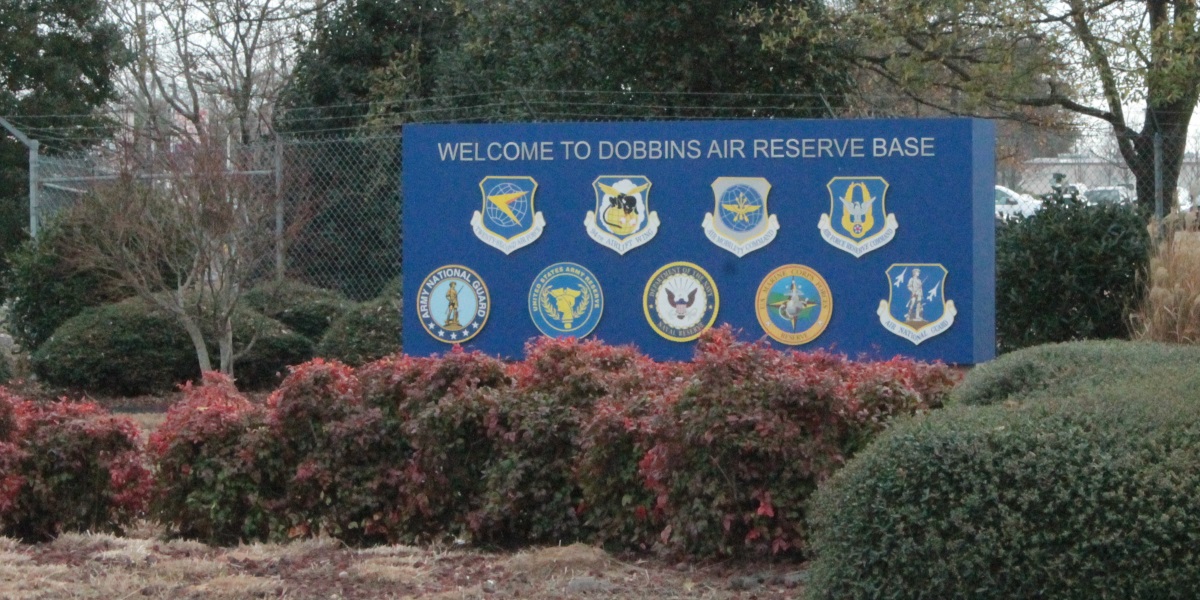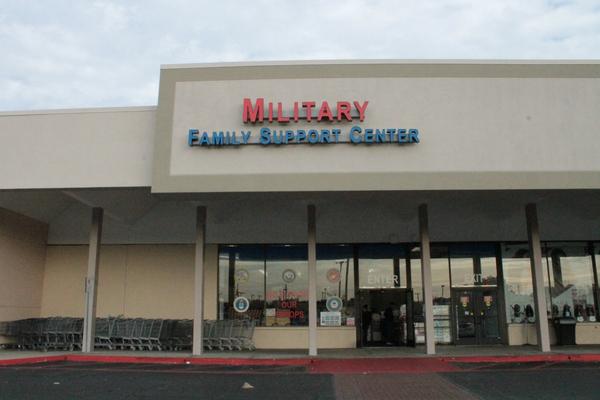Is Metro Atlanta Friendly To Active-Duty Military?

Mary Claire Kelly / WABE
This story is part of WABE’s project called “Atlanta Asks,” in which we invite our audience to ask us questions so we can find the answer.
Shannon J Gilliam asks: “Is Atlanta a friendly city towards active-duty military? I know there is a sizeable amount of reservist in the metro area but few active.”
This is a deceptively complicated question, both because of the meaning of the word “friendly” and because of Atlanta’s recent history with its military institutions. Both Fort McPherson and Fort Gillem in the south metro Atlanta area closed in 2011 due to a 2005 Base Realignment and Closure process, leaving Dobbins Air Reserve Base as the only major military hub in the metro Atlanta region. Currently, Georgia’s closest active duty installations to the city are outside of the metro area, including Robins Air Force Base in Warner Robins, Fort Benning in Columbus and Fort Gordon in Richmond County.
Active Duty
According to figures from the Department of Defense, there are 772 active-duty service members assigned in the metro Atlanta area. There are 5,163 reservist members – whose work in the military is on a part-time basis – assigned to Dobbins, according to the Cobb Chamber of Commerce. For comparison, Fort Benning’s “Digital Welcome Packet” numbers its active duty forces at 27,436 with 14,146 off post, and its reserve forces at 6,639.
That means the general attitude of Atlantans to military in uniform may be different than that of civilian populations in cities like Columbus that have a larger, more active military center. Brigadier General Thomas Carden, commanding general of the Georgia Army National Guard, said his experiences have generally been that people in the metro Atlanta area respect the uniform, but they may not be used to it.
“If you compare it to maybe outside the gate at Fort Benning, Georgia, I would say people here are a little bit more curious because they don’t see as much of it,” he said. “Over at Fort Benning where you’ve got thousands of soldiers that live out in the community and go on the large post every day, people there just see more of the military, so they’re a little bit more familiar with us. So I think we get a few more questions, but outside of that I don’t see a whole lot of difference.”
For members of the military, being stationed in Atlanta may take some acclimation as well. Ken Dixon, an acceptance pilot with the defense contract management agency at Lockheed Martin, said community life is different when living in a civilian area versus on a base.
“On a military base, it’s just you’re in a community of people who do the same things you do, you know what I mean?” he said. “Versus, down the street a friend of yours is in finance or somebody has a small business. That’s exciting to military folks, because we’re not used to that except for our own families who are far away from us.”
Dixon said that because the number of military members in the area is so small, everyone tends to recognize one another, but in his experience, people stationed in Atlanta tend to look to their neighborhoods for community rather than their work at the base. Service members in metro Atlanta live in civilian communities because, without an active-duty base in the area, there is no on-post living. That means that military families in the area do not make the choice to live on or off base, because private housing is the only option.
“You’re going to have to realize that there’s not a lot of stuff that you would be used to at a military base, if that’s the friendly you’re talking about, because we don’t have that here in Atlanta,” Dixon said. While Dobbins does have some facilities, like a gym, Dixon said active-duty members often have to drive to other locations, like Fort Benning or Robins, for annual physicals and other routine activities.
Not Quite A Commissary
One amenity that has been noticeably lacking in metro Atlanta since Fort Gillem’s closure is a commissary, which functions as a grocery story with discounts for active duty, reservist and veteran military, as well as their families. To fill that gap, the Cobb County Chamber of Commerce entered a first-of-its-kind partnership with the Department of Defense to open a Military Family Support Center in 2016, which provides services similar to a commissary three days out of the month as an on-site sale.
The store that houses the on-site sale once a month sits in a sand-colored strip mall a short drive from Dobbins, sandwiched between Burlington Coat Factory and a beauty supply store. On a cool Friday in December, it bustles with the racket of grocery cart wheels and idle conversation, as men, women and entire families check their military IDs at the door.
Susan Edmonds, store director at Robins Air Force Base commissary, does what she calls the “leg work” of running the Military Family Support Center; she secures and brings the all the goods and supplies (including cash registers) to the location.
“To the community, it offers camaraderie for the military,” Edmonds said. “It offers them the use of their benefits that they were given when they joined the military.”
Military Population
Many of the shoppers at the on-site sale when it’s open are military family members and veterans. While metro Atlanta may not have a proportionately large active-duty population, the 2012 American Community Survey estimates around 339,500 veterans live in the Atlanta-Marietta-Sandy Springs Metro Area.
One of those veterans is David Connell, president and CEO of the Cobb Chamber of Commerce. Once a member of the Air Force, he now works to foster partnerships, like the Military Family Support Center, between the Chamber and the area’s military population.
“Because of sequestration, our military is asked to do their job without enough assets, so base closures are a reality and we don’t want our base to close,” he said. “If it were to be closed as a part of cost cutting, it would cost – in a five-year period it would cost Cobb County 20,000 jobs and $3.2 billion of economic activity. So it’s very important to us.”
In addition to the public-private partnership involved in the Military Family Support Center, the Cobb Chamber also supports the Atlanta Regional Military Affairs Council (ARMAC), which “provides a continuing effort to foster partnerships, education and a strong working relationship between the business and military communities in the metro Atlanta area,” according to the Chamber’s website. ARMAC runs special events and programs for military and the wider community throughout the year, including a Military Appreciation Luncheon and a program called “Honorary Commanders,” in which a community leader is paired with a military commander to learn more about military activities.
Connell noted one activity in particular geared toward active-duty military: “Every time we have deployment overseas, and we have them probably … two or three times a year, four times a year – sometimes more in smaller groups – but we go out, we go feed them and their families. We have an event where we thank them for their service and as you know it’s kind of sad to see families split up and to know your loved one is going over to Afghanistan, for example.”
Friendly Culture
With much of the metro Atlanta region’s military activity centered in Cobb County, Connell mentioned one much-hyped event as a benefit of living in the area for military and non-military alike: the Atlanta Braves’ northward migration.
One of the perks of living near a major city like Atlanta according to Susan Short, the information, ticket and travel manager at Dobbins, Atlanta sports teams like the Braves are on a long list of organizations generous in military discounts – although they may not overtly advertise it. In her morale position orchestrating and spreading the word about military-specific discounts and perks, she sees a lot of effort from local companies and organizations to help the military.
“There’s a lot of different places in this local area that offer military discounts for family members and the military member, but there’s some that actually let the military in for free,” she said. “They’re not widely advertised, unfortunately, but what I tell my folks is, always ask, you never know.”
While metro Atlanta may have lost some of the amenities typical of a “military-friendly” area, many of the region’s companies, organizations and populations ensure that the friendliness toward servicemen and women remains part of its culture. Dixon said, despite the lack of typical resources, he and his family “cannot complain at all” about their life stationed near Atlanta.
“I’ve literally had people go out of their way to come over and shake my hand,” he said. “I’ve had moms get their kids together and take pictures with me … People want to talk to you, they want to tell you their stories, they want to thank you, they want to tell you about the time they were in the service or they want to tell you about somebody they know that was in the service. And I really honestly cannot sit here and say one single time living in this city where somebody has been disrespectful or somebody’s said something to me. It’s just been a really nice experience.”
9(MDAxODM0MDY4MDEyMTY4NDA3MzI3YjkzMw004))








